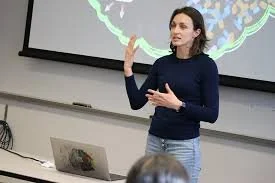Gut Meets Gadget: Finding Balance Between Technology and Health
Have you ever wondered how moving to a new country might change not just your lifestyle, but your very biology? Behind every meal we eat, every tradition we adapt or leave behind, lies a hidden story—told by the trillions of microbes inside us. These tiny organisms shape our health in ways we are only beginning to understand.
In a recent episode of the Immigrant Nation Podcast, Dr. Carolina Tropini, a leading microbiota researcher and professor at the University of British Columbia, unpacked the fascinating connections between immigration, diet, lifestyle, and technology. She explained how immigrants, in particular, experience profound biological shifts as they adapt to new diets and environments. Her insights remind us that our inner ecosystem tells a story of adaptation, resilience, and sometimes loss.
Dr. Tropini paints a vivid picture of the digestive system as a living universe. Food begins its journey with chewing, then peristalsis—the muscular waves that carry it forward. While the stomach, with its high acidity, keeps bacterial numbers low, the lower gut is home to an astonishing 10 trillion microbes—100 times more than the stars in the Milky Way.
These microbes aren’t just passive residents. They manufacture vitamins, generate anti-inflammatory compounds, and act as bodyguards against harmful pathogens. It’s why a traveler may fall sick from local food while a resident with a diverse microbiota remains unaffected. Our microbes are our lifelong companions, shaping how we respond to the world.
Modern life is full of contradictions. While medicine and technology extend lifespans, our diets have shifted toward processed foods and away from natural fibers. This shift weakens the microbiota, stripping away its diversity and resilience. Dr. Tropini compares it to a forest: just as changing weather can wither ecosystems, dietary changes can cause entire communities of beneficial microbes to disappear.
For immigrants, this paradox deepens. Adapting to new countries often means losing access to traditional foods. Even subtle changes—like the taste of milk—reshape the microbiota until it mirrors that of the new country. In the process, part of one’s biological heritage is rewritten.
One of Dr. Tropini’s current projects looks at early life inflammation and its connection to brain development. Inflammatory diseases are increasingly common in children, and her lab is exploring how to reduce these risks. By working with patient samples and lab models, her team aims to uncover strategies to nurture resilience in a world where high-fiber, traditional diets are harder to maintain.
Dr. Tropini is clear: whole foods should come before supplements. An orange, for example, delivers fiber and protective compounds absent in juice. Supplements, she says, are reductions of food—not replacements.
Her point is backed by research. An Israeli study of 800 participants revealed surprising results: some people spiked blood sugar after eating bananas but not cookies, while others had the opposite response. This highlights the deeply personal nature of diet—and the exciting possibility of using Artificial Intelligence to craft customized nutritional guidance.
Yet technology has its darker side. As a mother, Dr. Tropini worries about how over-reliance might erode children’s creativity and independence. She likens it to always using Google Maps instead of learning how to navigate. With technology advancing faster than regulation, the burden falls on parents to set boundaries. Her philosophy: let children be 'kids first,' grounded in community and play, reflecting our biological need for human connection.
From tooth decay caused by sugar-rich modern diets to microbes that can influence cancer treatment, Dr. Tropini’s work underscores the body’s interconnectedness. Her cross-disciplinary approach—bridging microbiology, bioengineering, and biophysics—reflects her belief that solving real-world health problems requires breaking academic silos.
For immigrants, the crossroads is personal. Should they cling to traditional foods to protect microbial diversity, or embrace new diets that may erode it? Each path carries benefits and risks.
Our microbiota tells the story of who we are, where we come from, and how we adapt. As modernization and migration continue to shape our inner ecosystems, we face a profound choice:
Will we blend tradition and innovation to nurture the invisible world within us, or let convenience dictate the health of future generations?
Watch the full conversation on YouTube: https://www.youtube.com/watch?v=KUvJrSHuhlE
Or tune in on Spotify: https://shorturl.at/cJRoF


